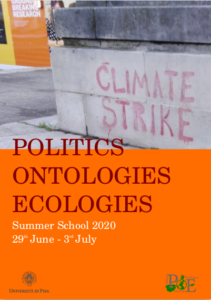 Summer school
Summer school
POLITICS, ONTOLOGIES, ECOLOGIES
Pisa, 29 June-3 July 2020
Theme and goals
Political ecology is a long-established interdisciplinary field aimed at investigating the interface of societies and the biophysical world as affected by, and in its turn affecting, the political order and related dynamics of conflict and cooperation, domination and emancipation. Political ecology also questions the (purportedly) apolitical outlooks on the socio-ecological crisis, dawned in the early 1970s and now full-blown, assuming that the problem can be tackled in politically neutral terms leaving unaddressed the way science and technology intermingle with power and interests.
The emergence of the notion of Anthropocene, the acknowledgment of fast-accelerating climate change, the worldwide spread of ‘environmental justice’ mobilizations and the recently arisen theme of the ‘Green New Deal’ have in different ways stressed that the crisis cannot be effectively tackled, whether in terms of mitigation or adaptation, without addressing its social causes. This means looking at the interweaving of the various aspects (economic, scientific, regulatory, institutional, cultural, geopolitical etc.) that impinge on how the biophysical world (including the human body) is conceived, technologies are developed, value is extracted and the related benefits and costs, risks and uncertainties, are distributed across peoples, places, genders and generations.
Of particular relevance in this vein is to investigate ongoing transformations in the global order and governmental approaches, emergent technological landscapes and narratives of crisis and remedy, new social mobilizations and conflicting ontologies of the human and the nonhuman. This entails making a step forward, compared with traditional political ecology outlooks, which regard western ontology as unproblematic and uncontentious, to focus on the intersection and reciprocal affection of three themes or problem-fields: politics, ontologies, ecologies.
Aims
The Summer School will offer postgraduate and PhD students and early career researchers the opportunity to interact with international scholars with a background in a variety of social science fields relevant to an advanced political ecology approach to the socio-environmental crisis.
Topics addressed include:
- Critical perspectives on the crisis (post-Marxist, de/post-colonial, feminist, etc.)
- Environmental justice, ontological struggles and everyday environmentalism in the global North and South
- Innovation and the transformation of capitalism: emergent technologies and new arrangements of production and reproduction
- Climate change, catastrophism and chronopolitics
- Just transition, work and sustainable welfare
- Growth, limits and de/post-growth
- The Anthropocene as risk and opportunity for socio-ecological change
- Value, valuation and valorisation
- Alternative economies and conceptions of economy
- “More-than-human” ecologies and ecologies of care
Description of activities
Activities will be articulated in morning and afternoon sessions, combining lectures and group work with both a theoretical and an empirical perspective, focusing on analytical frameworks, research methods and experiences. Attendance will be evaluated in terms of active participation and personal contribution to collective work. The ECTS credits that will be allocated to the successful participants are 3. All participants will receive a certificate of attendance.
Confirmed speakers
-
Donatella della Porta, Scuola Normale Superiore, Pisa
-
Dennis Eversberg, University of Jena
-
Francesca Forno, University of Trento
-
Luigi Pellizzoni, University of Pisa
-
Miriam Tola, University of Lausanne
-
Giacomo D’Alisa, CES University of Coimbra
- Pietro Saitta, University of Messina
Admission requirements
Applicants should hold a BSc, MSc or PhD in social and political sciences and humanities. Curricula in natural sciences and science and technology studies may be eligible as well. Candidates will be selected on the basis of their CV and research interests, maintaining a balanced participation in terms of gender and nationality of candidates. The organizers reserve the right to cancel the summer school if fewer than 20 students are enrolled. A maximum number of 35 students will be admitted to the school.
Benefits from attending
Students will gain insights and suggestions on how to develop a political ecology outlook on the study of the socio-ecological crisis and ongoing transformations at societal, governmental and techno-scientific level, by attending lectures and practising concepts, theories and empirical methods. Moreover, the school is intended to act as an intellectually and socially stimulating environment, complementing the work carried out by the POE-Politics Ontologies Ecologies community of research (see www.poeweb.eu) and following its spirit of open and informal sharing, learning, and networking.
How to apply
Instructions on how to apply and on how to pay the school fee are available on the University of Pisa website: https://www.unipi.it/index.php/how-to-apply In addition to the standard documentation, a statement of purposes (maximum 500 words) is mandatory only for scholarship applications. The statement of purposes for applications must be sent to Professor Luigi Pellizzoni, Director of the School, at: luigi.pellizzoni@unipi.it.
Fee
School attendance is free.
Important dates
June 5th, 2020: Applications deadline.
Scientific and Organizing Committee
Luigi Pellizzoni, University of Pisa & Director of the School
Laura Centemeri, EHESS Paris
Sonia Paone, University of Pisa
Salvo Torre, University of Catania
Viviana Asara, WU University Vienna
Dario Minervini, University of Naples “Federico II”
Info
Please, contact the summer schools office (support.summerschool@unipi.it) for information about fees, applications, and other administrative details, and prof. Luigi Pellizzoni (luigi.pellizzoni@unipi.it) for questions about scholarships and program.
